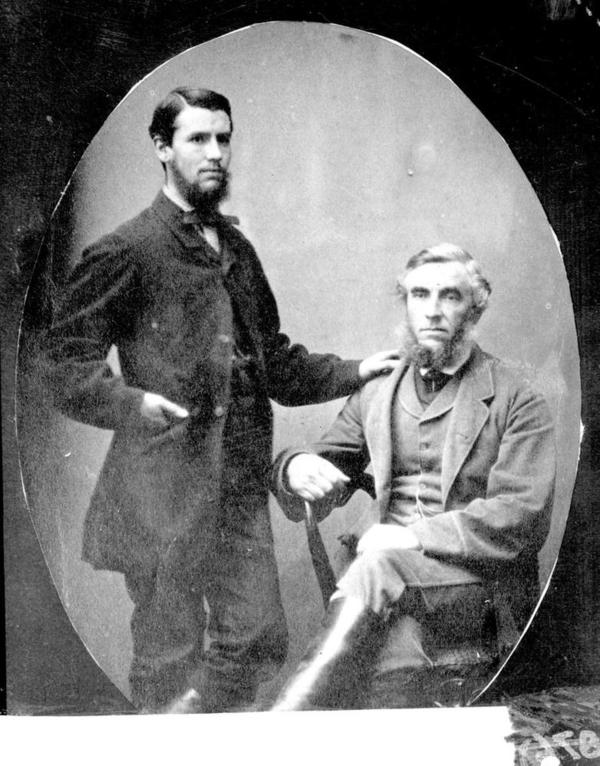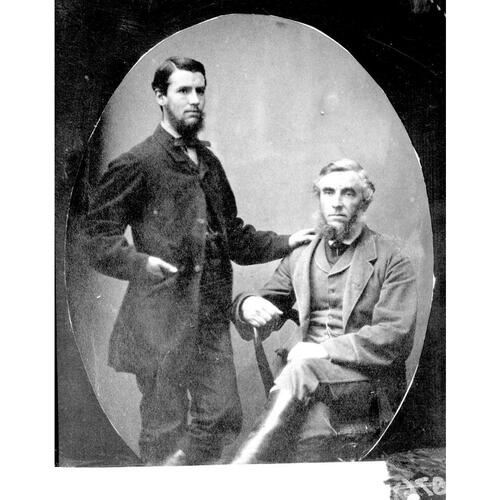
Source: Link
EVANS, JOHN, miner and mla; b. 25 Jan. 1816 at Machynlleth, north Wales; m., in Wales, first, on 1 June 1840, Martha Evans (who died young) and secondly, in November 1842, Ann Thomas (d. 1866) by whom he had three sons and two daughters, and at Victoria, B.C., on 24 April 1877, Catherine Jones; d. 25 Aug. 1879 at Stanley, B.C.
Born and brought up in a Welsh village, John Evans worked as a young man in Manchester, but in 1854, in order to give his children a “pure Welsh” upbringing, he moved to Tremadoc, where he had interests in several small quarries. In 1863 he emigrated to British Columbia in charge of “one of the better organized attempts to secure gold in the Cariboo.” Henry Beecroft Jackson, a wealthy Manchester cotton manufacturer, offered to finance the project for two years, all profits to be divided: one half going to the men in equal shares; the other half to Evans and his patron. Evans personally selected 26 respectable north Welsh miners including his second son Taliesin, and on 22 Dec. 1862 the men sailed aboard the Rising Sun for Victoria via Cape Horn. Evans himself went by the shorter Panama route. Leaving Liverpool on 17 Feb. 1863 he arrived on 15 April, and thus had time to examine various mining possibilities on the mainland before the Rising Sun docked on 10 June.
Having applied for a mining lease on Lightning Creek, “Captain” Evans, as his men called him, left Victoria at the head of the Welsh company on 16 June, and after a gruelling journey over the Harrison-Lillooet trail established on 21 July the “Basford Mines,” at the junction of Last Chance and Lightning creeks, the site of the present settlement of Stanley. Capital, skill, and energy were not wanting; nevertheless the venture failed. The glowing descriptions of the Cariboo by the Victoria correspondent of the London Times had ignored the exorbitant price of provisions, as well as the need for more efficient machinery than wooden pumps and waterwheels to control the water which flooded into the shafts. By the time the men’s contract expired on 1 Oct. 1864 eight rebels had already left the enterprise and Evans had recovered only $450 worth of gold for an expenditure of over $26,000. Most of the Welsh company returned home, but their leader stayed on until he died, trying to develop claims on Antler and Davis creeks, acting as a mining and land surveyor in the Cariboo district, and cherishing the vain hope that “sooner or later something may turn up.” But he was never able to send for the wife or the “dear children” left behind in Wales.
Almost as soon as he arrived on Lightning Creek, Evans was asked to stand for election to the first Legislative Council of the mainland colony. He consented, chiefly in order to press for the amendment of the existing mining laws which gave no protection to the man who had sufficient capital to embark on a large-scale venture. A claim could be staked only by an individual miner, who was then free to dispose of it as he chose. Thus Evans had been compelled either to place himself at the mercy of his workmen by recording titles in their names, or to lease ground abandoned by individual miners. He was defeated in the elections of 1863, 1865, and 1871. Finally in 1875 he was elected to the Legislative Assembly of the province, and re-elected in 1878. He declared himself to be “no party man,” but voted as his conscience bade him, and “his energetic and eccentric manner in urging his views on the House” was long remembered.
A strict Nonconformist, who had hoped to give part of his mining profits to the Booth Street Welsh Congregational Chapel in Manchester, Evans did his best to improve manners and morals in the Cariboo. He frowned on drinking, gambling, and swearing and would not allow his men to work or travel on Sunday. In 1866 he and other Welshmen built the Cambrian Hall in Barkerville, where religious services, literary meetings, and celebrations of St David’s Day were held until the great fire of 1868. Evans had no great success as a miner, but he was loved and respected throughout the Cariboo for his generosity, his scrupulous integrity, and his courage in maintaining the principles he believed to be right. For the simple wooden head-board of his grave in the Stanley cemetery his friends chose the fitting epitaph: “Blessed are the dead who die in the Lord.”
PABC, John Evans papers. British Columbia, Legislative Assembly, Journals, 1876–79. Cariboo Sentinel (Barkerville, BC.), 1865–75. Colonist (Victoria), 1863–79. Victoria Daily Standard, 28 Aug. 1879. Can. parl. comp., 1876; 1877; 1878; 1879. Alan Conway, “Welsh gold-miners in British Columbia during the 1860’s,” BCHQ, XXI (1957–58), 51–74. R. L. Reid, “Captain Evans of Cariboo,” BCHQ, II (1938), 233–46.
Cite This Article
Dorothy Blakey Smith, “EVANS, JOHN,” in Dictionary of Canadian Biography, vol. 10, University of Toronto/Université Laval, 2003–, accessed April 2, 2025, https://www.biographi.ca/en/bio/evans_john_10E.html.
The citation above shows the format for footnotes and endnotes according to the Chicago manual of style (16th edition). Information to be used in other citation formats:
| Permalink: | https://www.biographi.ca/en/bio/evans_john_10E.html |
| Author of Article: | Dorothy Blakey Smith |
| Title of Article: | EVANS, JOHN |
| Publication Name: | Dictionary of Canadian Biography, vol. 10 |
| Publisher: | University of Toronto/Université Laval |
| Year of revision: | 1972 |
| Access Date: | April 2, 2025 |



